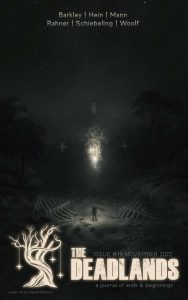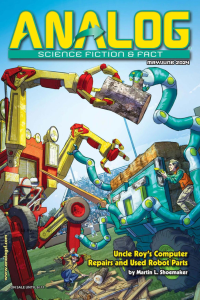Paula Guran Reviews The Deadlands, PodCastle, and Dark Matter
 The Deadlands 11/22, 12/22
The Deadlands 11/22, 12/22
PodCastle 12/20/22
Dark Matter 11-12/22
The Deadlands is a monthly speculative fiction magazine. They “publish short stories, poems, and essays about the other realms, of the ends we face here, and the beginnings we find elsewhere. It is an adventure into the unknown, to meet those who live there still, even though they may be dead. Death is a journey we all will take, but we’d like to peek at the map before we go.” So, yes, the theme may not be for everyone, but it always offers something of interest. It also offers excellent nonfiction. The Deadlands #19 has two originals. The protagonist of Wesley Woolf’s “Pleiades” must make certain discoveries before moving along in death. The dead in “The Counting Ghosts” by Bernie Jean Schiebeling wonder about the things they did not know they have lost.
The Deadlands #20 also has a duo of originals. In the evocatively written “A Harvest of Bones” by Eugenia Triantafyllou, the bones of their ancestors provide transformative power for villagers to defeat yet another invading army. The downtrodden always gain strength from a knowledge of the past. “L’homme de Houbigant” by Jonathan Louis Duckworth & Joe Koch is probably about an elderly mystery writer who has murdered her spouse looking back after her own death. Maybe. It bears another reading, which is not a bad thing.
Good Christmas speculative fantasy can be hard to find, but Heather Shaw & Tim Pratt gift us a diverting yet meaningful story with PodCastle 766’s “Lockdown Around the Christmas Tree”. Immunocompromised and isolated since the pandemic started in 2020, Christmas 2022 is looking pretty grim for Mischa – until they write a letter to Santa. Santa comes through in a big, life-changing way.
The stories in Dark Matter #12 focus, according to its “Letter from the Editor,” on “the ways that we are used, abused, and exploited by powerful systems beyond are control…” In Lyndsey Croal’s “Patchwork Girl”, lab-grown “women” are available to be murdered over and over in film or on stage. They aren’t supposed to feel pain. But the protagonist does. Parents can’t help but, at least occasionally, wish for a magic potion that could quiet children. David Worn gives us one in “Lullaby” – a pill of that titular name that knocks kids out. Despite the downside of children not aging while dosed with Lullaby, parents use it – a lot. On the other end of the human age scale, in Mark Burnham’s “Helter Smelter”, 65-year-old Val Pinker is the first to go through a procedure that “transmutes” his life into another living body. Not surprisingly, there are dire complications. Sonia, in Jennifer Lee Rossman’s “The Care Home”, can live on her own thanks to super-smart home AI tech that feeds, clothes, and keeps her incapacitated body clean. But her house has a mind of its own. In “Binge” by R.L. Meza, lab-grown actors are moved about like marionettes through primitive means involving fishhooks in flesh connected to cables manipulating movement. This “technology” in a world that can “grow” humans? The story didn’t work for me. Beautician Victoria, in Andrew Rucker Jones’s “Blueing”, uses a “facelifter” machine to get even with a member of the elite. “Salvage” by Sarah Fannon is another tale where impossible technology is hard for me to overcome. Her entire family murdered, a roboticist protagonist builds droids that, through seances, put her in touch with the spirit world and – she thinks – her dead family. “WonderYears Incorporated has no comment” by Caity Scott presents “hunbots” that provide all a man could want: cooking, cleaning, sex, and no talk. Again, the conclusion is predictable.
Recommended Stories
“A Harvest of Bones”, Eugenia Triantafyllou (The Deadlands 12/22)
Paula Guran has edited more than 40 science fiction, fantasy, and horror anthologies and more than 50 novels and collections featuring the same. She’s reviewed and written articles for dozens of publications. She lives in Akron OH, near enough to her grandchildren to frequently be indulgent.
This review and more like it in the February 2023 issue of Locus.
 While you are here, please take a moment to support Locus with a one-time or recurring donation. We rely on reader donations to keep the magazine and site going, and would like to keep the site paywall free, but WE NEED YOUR FINANCIAL SUPPORT to continue quality coverage of the science fiction and fantasy field.
While you are here, please take a moment to support Locus with a one-time or recurring donation. We rely on reader donations to keep the magazine and site going, and would like to keep the site paywall free, but WE NEED YOUR FINANCIAL SUPPORT to continue quality coverage of the science fiction and fantasy field.
©Locus Magazine. Copyrighted material may not be republished without permission of LSFF.







